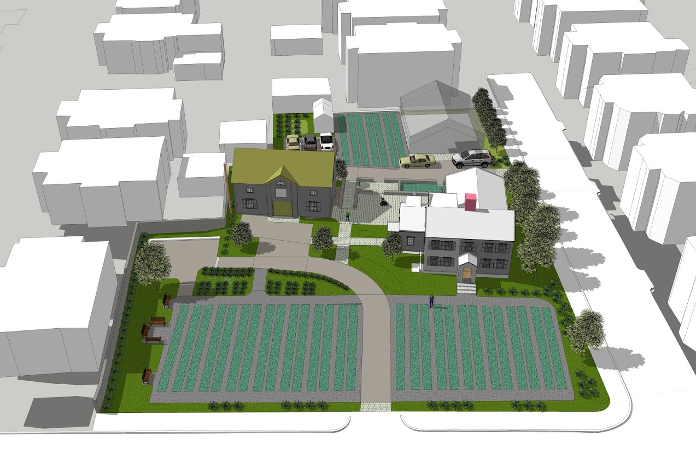
27 Jul 2016 Design for Social Impact: Perkins+Will Re-Envisions Fowler Clark Epstein Farm
The Architectural firm of Perkins + Will is designing the new urban farming education and training center at the Fowler Clark Epstein Farm, and they are bringing the firm’s Social Responsibility Initiative to this project, donating a substantial portion of design fees as a means of bringing excellence in design to a project with strong social goals
The Social Responsibility Initiative (SRI) at Perkins+Will aims to utilize the vast array of talent, expertise, and skills for the greater good of the community, one project at a time. Conceived in 2007 as an opportunity to give back to our community, the program grew quickly to include all 24 offices across the globe. The firm, in addition to encouraging and supporting a culture of volunteerism in our local community, donates 1% of its billable time and talent to initiate and execute projects and buildings that serve the broader society. This commitment represents the equivalent of a fifteen-person firm working full time as a pro bono organization and has, over the past ten years, completed more than 100 projects.
Each office, at the discretion of the leadership, chooses a project that represents the opportunity to do greater good with design. For the Boston office, this opportunity presented itself when paths crossed during a panel discussion, hosted by our office, dedicated to Urban Farming opportunities in the Boston area. That evening introductions were made which evolved into an opportunity for Perkins+Will to be the Architect for the Fowler Clark Epstein Farm, a project that brings together design, urban agriculture, community building, and preservation. The stewards of the project, a partnership of Historic Boston Incorporated (HBI), Trust for Public Land (TPL), Urban Farming Institute (UFI), and North Bennet Street School (NBSS), formed in 2015 with a core mission to rehabilitate the farm buildings and .7 acre property, re-envisioning the site as an urban farm that will serve as a hub for the Urban Farming Institute, a Boston based non profit that centers around health, education, and entrepreneurship.
Brooke Trivas, Practice Leader for K-12 and Principal in Charge of the SRI at Perkins+Will, leads the design process alongside a passionate and dedicated team at Historic Boston Incorporated, who regularly tackle challenging projects that preserve and restore landmarks throughout the city. “This project means so much to Perkins+Will and to the people of our city. As a design firm rooted in Boston we are leveraging our talent and resources to provide a service that will strengthen the Urban Farming Institute, an organization that benefits the community through education and outreach. We are so proud to partner with these outstanding organizations that have come together to develop and strengthen a culture of health in Boston.”
Stephen Messinger, Project Architect at Perkins+Will sees the Fowler Clark Epstein Farm as the perfect intersection of community building and sustainable design. “I came to Perkins+Will because of its commitment to use design for the betterment of society and because of its clear focus on sustainability. On every Perkins+Will business card it says: “Ideas + Buildings that honor the broader goals of society”. That?s a commitment that we make every day and its one that is intrinsically shared with the mission of the Fowler Clark Epstein Farm project.”
The Fowler Clark Epstein Farm, when complete, will provide nearly a half acre of intensive growing space, an 800 sf greenhouse, office space, a Farm Manager’s residence, and a full classroom and teaching kitchen. The strong historic character of the existing buildings and site will remain a central focus of the project, anchoring the project prominently on the corner of Norfolk and Hosmer streets in the dense urban locale of Mattapan. The first growing season will be summer 2017. For more information about the project, contact Historic Boston Incorporated.



